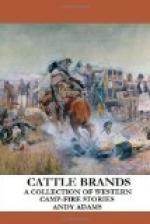Ten years of privation and hardship, in their new home, had been met and overcome, and now he could see a ray of hope for the better. The little prosperity which was beginning to dawn upon himself and family met with a sudden shock, in the form of an old judgment, which he always contended his attorneys had paid. In some manner this judgment was revived, transferred to the jurisdiction of his district, and an execution issued against his property. Sheriff Ninde of this county was not as wise as he should have been. When the execution was placed in his hands, he began to look about for property to satisfy the judgment. The exemption laws allowed only a certain number of gentle horses, and as any class of range horses had a cash value then, this brand of horses was levied on to satisfy the judgment.
The range on which these horses were running was at this time an open one, and the sheriff either relied on his reputation as a bad man, or probably did not know any better. The question of possession did not bother him. Still this stock was as liable to range in one county as another. There is one thing quite evident: the sheriff had overlooked the nature of this man Gray, for he was no weakling, inclined to sit down and cry. It was thought that legal advice caused him to take the step he did, and it may be admitted, with no degree of shame, that advice was often given on lines of justice if not of law, in the Lone Star State. There was a time when the decisions of Judge Lynch in that State had the hearty approval of good men. Anyhow, Gray got a few of his friends together, gathered his horses without attracting attention, and within a day’s drive crossed into the Indian Territory, where he could defy all the sheriffs in Texas.
When this cold fact first dawned on Sheriff Ninde, he could hardly control himself. With this brand of horses five or six days ahead of him he became worried. The effrontery of any man to deny his authority—the authority of a duly elected sheriff—was a reflection on his record. His bondsmen began to inquire into the situation; in case the property could not be recovered, were they liable as bondsmen? Things looked bad for the sheriff.
The local papers in supporting his candidacy for this office had often spoken of him and his chief deputy as human bloodhounds,—a terror to evil doers. Their election, they maintained, meant a strict enforcement of the laws, and assured the community that a better era would dawn in favor of peace and security of life and property. Ninde was resourceful if anything. He would overtake those horses, overpower the men if necessary, and bring back to his own bailiwick that brand of horse-stock. At least, that was his plan. Of course Gray might object, but that would be a secondary matter. Sheriff Ninde would take time to do this. Having made one mistake, he would make another to right it.
Gray had a brother living in one of the border towns of Kansas, and it was thought he would head for this place. Should he take the horses into the State, all the better, as they could invoke the courts of another State and get other sheriffs to help.




